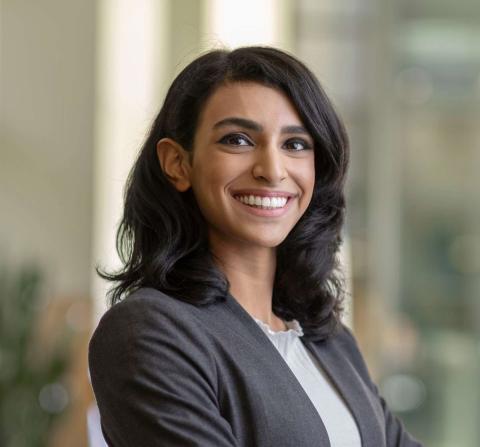Since Karina Dsouza was growing up in New Milford, New Jersey, she was interested in medical technology. When looking for a graduate school program, she was drawn to the research opportunities at Case Western Reserve University. “Getting the chance to work with prostheses that allow for sensory feedback was really exciting,” she said.
Dsouza joined Professor Dustin Tyler’s lab at CWRU in Fall 2020 to focus on neuroprostheses, and, recently, defended her M.S. thesis, “The Effects of Socket-Fit and Residual-Limb Load on 3-DoF, Simultaneous and Proportional, Myo-Prosthesis Hand Control and Chronically Implanted, Intramuscular EMG Patterns.” Having worked with study participants who wanted to ensure their prostheses worked equally well under all conditions, she developed a 3 Degree-of-Freedom. The controller uses an Artificial Neural Network (ANN) to map recorded EMG patterns to wrist pronation/supination, wrist flexion/extension, and hand closing/opening movements.
While using the controller to conduct experiments, Dsouza had the study participant perform posture-matching tests while modulating residual limb load and socket fit. After analyzing data, she discovered that EMG hand posture patterns changed with adjustments to socket fit.
Since the electrodes she used were inserted directly into the muscle rather than sitting on the skin’s surface, she thinks these changes are more likely due to changes in muscle activity rather than motion artifacts or noise. She also discovered that the controller’s performance only degraded when residual-limb load was added during loose socket fit.
In addition to her own research, Dsouza appreciated the opportunity to play a role in Ph.D. student Sedona Cady's iSens system project. “It's a huge game changer for prosthesis technology,” she said of the project. “It's so exciting to see a participant go home, use our devices, and move his prosthesis with the controller I made.” Dsouza was also excited to have her work featured on 60 Minutes and National Geographic.
During her M.S. studies, Dsouza looked up to the senior Ph.D. students in Tyler's group, including Cady, Nabeel Chowdhury, and Leah Roldan. “They're all so supportive and always make time to help out,” she said.
After Dsouza graduates with her M.S. in January, she will continue her studies at CWRU as a Ph.D. student in Assistant Professor, Dr. Nathan Makowki’s laboratory. She is excited to learn more about motor control and various machine learning algorithms.


